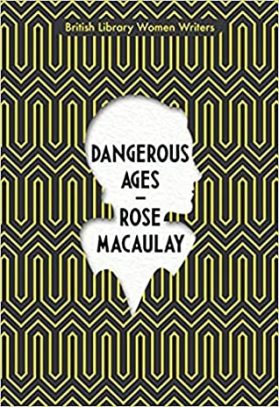 I intend to write about each of the British Library Women Writers titles as they come out, though I’m already a bit behind because the brilliant Father by Elizabeth von Arnim is also out now!
I intend to write about each of the British Library Women Writers titles as they come out, though I’m already a bit behind because the brilliant Father by Elizabeth von Arnim is also out now!
I knew, when I was first asked about women writers who shouldn’t be out of print anymore, that I was keen to get some more Rose Macaulay back. She is well known for The Towers of Trebizond, her final novel, but I prefer her witty, spiky novels of the 1920s. Perhaps they are less of a tour de force, but they have an awful lot to say about contemporary (middle-class) society, and they’re a hoot. I’m pleased to say that Handheld Press and Vintage have also been bringing back some of her novels from that period and, who knows, maybe some others will find their way into the BLWW series at some point. But there was one obvious choice for a series that looks at how novels reflected women’s lives in the early 20th century: Dangerous Ages (1921) does it for a whole bunch of different women.
Those women are several generations of the same family. Neville is in her 40s (yes, ‘her’ – Macaulay often gave her female characters male names) and thinking about resuming her career as a doctor. Her daughter is part of a generation that dismisses everything pre-20th-century and talks a lot about ‘free love’ etc – in fact, let me interrupt this list to give a wonderful piece of Macaulay dryness:
“Marriage,” said Gerda, “is so Victorian. It’s like antimacassars.”
“Now, my dear, do you mean anything by either of those statements? Marriage wasn’t invented in Victoria’s reign. Nor did it occur more frequently in that reign than it did before or does now. Why Victorian then? And why antimacassars? Think it out. How can a legal contract be like a doily on the back of a chair? Where is the resemblance? It sounds like a riddle, only there’s no answer. No, you know you’ve got no answer. That kind of remark is sheer sentimentality and muddle headedness. Why are people in their twenties so often sentimental? That’s another riddle.”
Neville’s grandmother is in her 80s and pretty content with life. But the character I found most interesting in many ways was Neville’s mother, known always in the novel as Mrs Hilary.
Mrs Hilary is in her 60s, ignored by the world, craving just a little bit of attention from anyone – and one of the options she experiments with is psychoanalysis. That’s what I wrote about in my afterword for the book, because it was such a ‘thing’ in the 1920s.
‘What you really wanted was some man whose trade it was to listen and to give heed. Some man to whom your daughter’s pneumonia, of however long ago, was not irrelevant, but had its own significance, as having helped to build you up as you were, you, the problem, with your wonderful, puzzling temperament, so full of complexes, inconsistencies, and needs. Some man who didn’t lose interest in you just because you were gray-haired and sixty-three.’
Macaulay is very witty about Freudianism, as so many writers were at the time, but also sees the need that it is answering in Mrs Hilary and the way that society neglected her. Which is impressive, considering she was only in her forties at the time herself.
There is a lot going on in this novel, and more characters and concerns than I have covered in this short review, but what holds it together is Macaulay’s intense interest in her characters. She laughs at them, but she understands them too. Each portrait is affectionate and kind, even when the ridiculous is on show. And it’s a complete delight of a novel. I’m so pleased it’s back in print, where it deserves to be!

Looking forward to this one Simon, as I’ve just read another excellent Macaulay. And I do think you’re spot on about her interest in her characters!
I’m so glad she is having a moment in the sun again!
I so enjoyed this one, a really good idea for a novel that then didn’t feel forced as events unfolded. My favourite character was Neville but she was the one nearer my age. I think I could go back and do my English degree again OK, though …
Yes, it felt much more natural than it could have done, considering she’d set up all these different decades and types.
I just read this one, too, after the lovely British Library people sent me a review copy. I haven’t reviewed it yet, but my review is due out next month.
Oo I’ll look forward to that!
All praise Dean Street Press! They really are coming out with some fantastic vintage books. This one looks good!
Dean Street Press ARE great but these are British Library :)